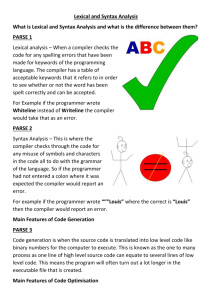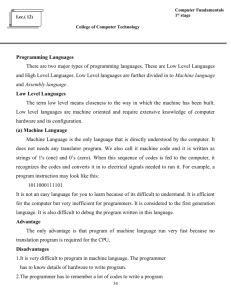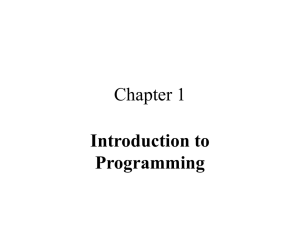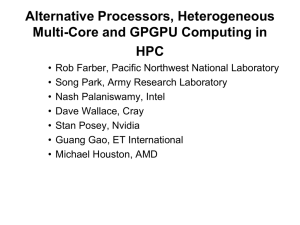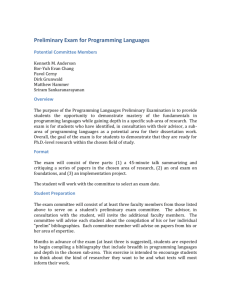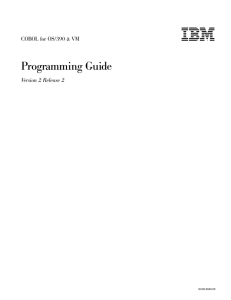10-0013 - COBOLStandard.info
advertisement
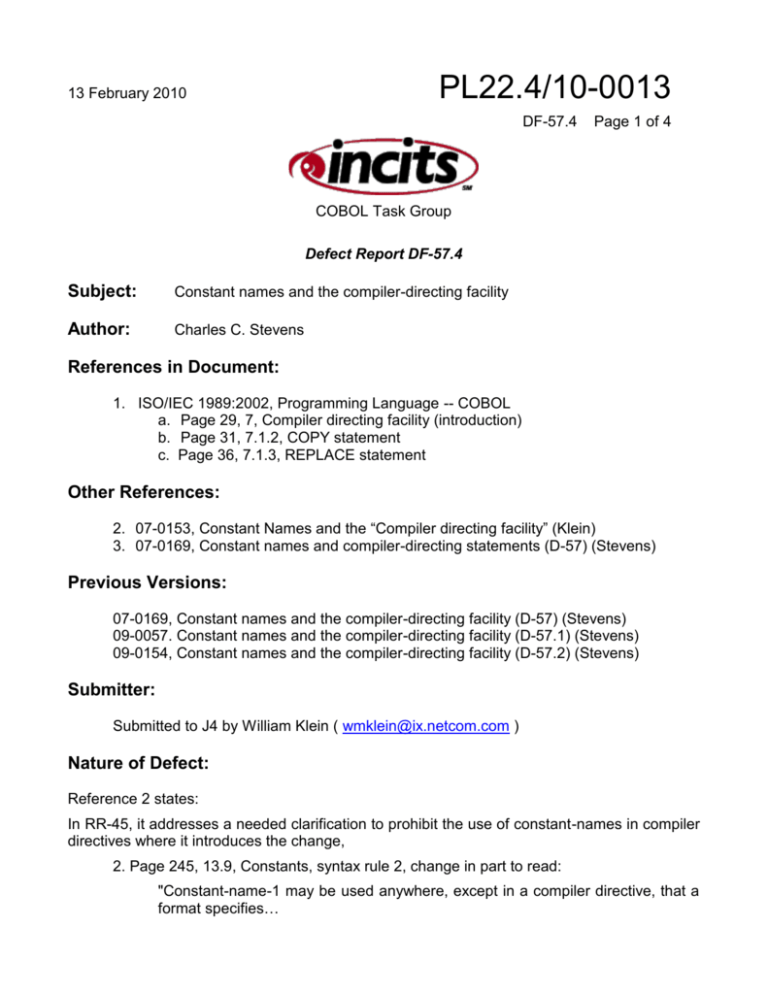
13 February 2010 PL22.4/10-0013 DF-57.4 Page 1 of 4 COBOL Task Group Defect Report DF-57.4 Subject: Constant names and the compiler-directing facility Author: Charles C. Stevens References in Document: 1. ISO/IEC 1989:2002, Programming Language -- COBOL a. Page 29, 7, Compiler directing facility (introduction) b. Page 31, 7.1.2, COPY statement c. Page 36, 7.1.3, REPLACE statement Other References: 2. 07-0153, Constant Names and the “Compiler directing facility” (Klein) 3. 07-0169, Constant names and compiler-directing statements (D-57) (Stevens) Previous Versions: 07-0169, Constant names and the compiler-directing facility (D-57) (Stevens) 09-0057. Constant names and the compiler-directing facility (D-57.1) (Stevens) 09-0154, Constant names and the compiler-directing facility (D-57.2) (Stevens) Submitter: Submitted to J4 by William Klein ( wmklein@ix.netcom.com ) Nature of Defect: Reference 2 states: In RR-45, it addresses a needed clarification to prohibit the use of constant-names in compiler directives where it introduces the change, 2. Page 245, 13.9, Constants, syntax rule 2, change in part to read: "Constant-name-1 may be used anywhere, except in a compiler directive, that a format specifies… 13 February 2010 PL22.4/10-0013 DF-57.4 Page 2 of 4 I believe that change was either incomplete or incorrect. It does not address the use of constant-names within “compiler directing statements” (e.g. COPY and REPLACE). Consider for example: Working-Storage Section. 01 AField Pic x. COPY ABC. 01 BField Pic 9. COPY XYZ. Where the library text within member XYZ includes. 01 ABC Constant “LMN”. It might be possible (but would certainly be difficult) to know that the first COPY statement refers to a library source named “LMN” and not “ABC” if the compiler “parsed” all the way through the source before resolving this COPY statement. However, if the constant name itself were defined WITHIN a member “LMN”, then this would become impossible to parse. Similarly, consider COPY XXX Replacing ABC by ==“XYZ”==. 01 ABC Constant “123”. As the REPLACING phrase allows for pseudo-text-1 to appear OR - Text-1 - Literal-3 - Word-1 I see no way that one can tell if “ABC” is a text-word, COBOL word, OR if it refers to the contents (literal value) of the constant-name ABC (.e.g. “123”. As far as I can (easily) see, there is no time that the REPLACE statement can have a literal (rather than a literal within pseudo-text), but even this seems problematic as the rules are currently stated. However, I also think that the change introduced by DR-45 may (or may not) actually be TOO strict. It is unclear to me whether the use of a constant-name should always be prohibited within compiler directives, or whether it actually only needs to be prohibited within compiler directives that are handled during the “text manipulation” phase of processing. (See the list on page 29 of which syntactic elements defined within “7 Compiler directing facility” are processed in the “Text manipulation” stage and which within the “Compilation” stage. It is possible (but I am not certain) that the best correction would limit the use of constant-names to syntax that is processed within the “compilation” stage and not to prohibit their use from all of the features defined within this section. Doing the latter would certainly be “safe” but is it necessary? Solution proposed by submitter: 13 February 2010 PL22.4/10-0013 DF-57.4 Page 3 of 4 Replace the change introduced by DR-45 with one of the following (depending upon the answer to the last question above): 2. Page 245, 13.9, Constants, syntax rule 2, change in part to read: "Except for formats defined within ““7 Compiler directing facility,” a constant-name-1 may be used anywhere that a format specifies… Or 2. Page 245, 13.9, Constants, syntax rule 2, change in part to read: "Except for statements processed during the “Text manipulation” stage” (as defined within “7 Compiler directing facility”), a constant-name-1 may be used anywhere that a format specifies… Discussion prior to Meeting 270: Constant names were introduced in the 2002 standard, as were compiler directives and the ability to “nest” COPY statements. The COPY statement itself was introduced in the 1974 standard, and the REPLACE statement and “pseudo-text” in the 1985 standard. The risks associated with allowing constants to be used in any of these contexts outweigh the benefits that might accrue. Discussion at Meeting 270: It was further noted that the use of a constant name (a data item declared with the CONSTANT keyword) implies that the parsing of the data declaration entry describing it has been completed. Given that the compiler directing facility affects the arrangement of the source file before any parsing of the “central” COBOL code is parsed, the completion of the processing of a data declaration entry as a prerequisite to the successful analysis of a compiler directive is neither appropriate nor possible. Thus, it is inappropriate to expect or permit constant-names to be used in place of literals in the compiler-directing facility. Discussion at Meeting 271: PL22.4 noted an error in the application of a change late in the development of the 2002 standard; that is corrected herein. Discussion at Meeting 274: The changes recommended in the previous version of this document in the text under the heading "Proposed INCITS/PL22.4 response" are more appropriately handled in the next revision and are deferred thereto. PL22.4 determined nature of defect: 13 February 2010 PL22.4/10-0013 DF-57.4 Page 4 of 4 It is not clearly stated that the use of a constant-name in a compiler directive or in a compilerdirecting statement in locations in which a literal might occur is not a supported feature of standard COBOL. Proposed INCITS/PL22.4 response: INCITS/PL22.4 concludes that the use of constant names in COPY and REPLACE statements, as well as compiler directives, is appropriately prohibited. The existence, to say nothing of the content, of constants is not determined until after the structured compilation group has been completed and parsing of that structured compilation groups is underway, and the application of many directives occurs during the creation of that structured compilation group. The risk of a change affecting existing programs is too great for a technical corrigendum for that reason. The recommendation that constant names be disallowed in compiler directives and compiler-directing statements, together with the changes suggested to implement that restriction, have been forwarded to ISO/IEC JTC1/SC22/WG4/OWG-1 for their consideration for a future revision. . . Changes Required for a Corrigendum: None.
